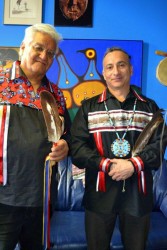Article Origin
Volume
Issue
Year
On April 19, the Odawa Friendship Centre held a thanksgiving and unveiling ceremony at Ottawa’s Elgin Street courthouse attended by about 300 people.
“We wanted to publicly acknowledge our partnership with the courts and give thanks to them, the Crown Attorney’s Office and all our other supporters,” said Mark Marsolais, a citizen of Whitefish River Ojibway First Nation in Ontario with over 20 years’ experience in the justice system.
Marsolais is also the coordinator with the Odawa Aboriginal Community Justice Program (OACJP), a diversion program for First Nations, Métis and Inuit people charged with summary conviction offences in Ottawa. The maximum penalty for such offences is six months imprisonment, a fine of $5,000 or both.
Three years ago, the Odawa Centre decided to tackle the problem of Aboriginal over-representation in the criminal justice system. Discussions with the Crown Attorney’s office resulted in the OACJP.
“The individual is pulled from the collective justice system and into our diversion program and their charges are dealt with through a traditional justice program.”
The focus is on healing rather than punishment, he stressed.
“We look at the whole person and not just as someone with charges. What we’ve found is they’re suffering from such intense trauma from past experiences with residential school or the child welfare system or both.”
The individual appears before a Justice Circle and a healing plan is designed that may include treatment for addictions, counselling, working with an Elder, and ceremonies such as sweat lodge.
“It’s a ground-breaking program that sets a new standard,” said Marsolais, “not just in Ottawa, but nationally and even internationally.”
APTN was there to cover the April 19 event and, according to Marsolais, it marked the first time cameras were allowed in the courthouse. Elders Annie St. Georges (Algonquin) and Terry McKay (Tsimshian) presided over the ceremony. McKay has been with the OACJP since its inception.
“We also wanted to unveil our new signs that will be posted in the courts,” Marsolais said. Posters were designed with Aboriginal art work that gives information about the OACJP, including contact numbers, in English, French and Inuktitut.
“No one’s allowed to put signs up in the courts,” said Marsolais. “It’s unheard of. This is an important first that will increase people’s access to our program.”
Aboriginal people going through the system often plead guilty because they don’t understand what’s happening, have trouble with the English language or don’t have access to a lawyer. Posting the signs, continued Marsolais, “shows the trust that’s built up in our relationship with the courts. We’ve demonstrated competency and commitment and that goes a long way.”
Ottawa has an Aboriginal population of about 40,000 people. About 150 people have gone through the OACJP since it started. Program participants are given three to six months, depending on individual circumstances, to work on their healing plan before appearing again in court. Their charges are dismissed provided they have upheld their part of the commitment.
Marsolais acknowledges that their clients sometimes relapse, but “they come back to us for help, usually before they go anywhere else. The healing process takes a long time,” he said, “but our program is making a difference.”
Photo caption: Elder Terry McKay and Program Coordinator Mark Marsolais who are with the Odawa Aboriginal Community Justice Program, Odawa Friendship Centre in Ottawa.
- 12690 views

